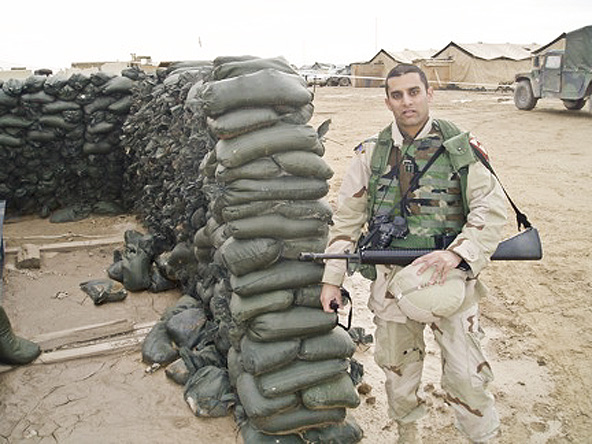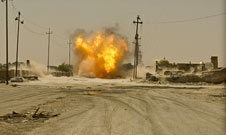
2004, Iraq. Cpt. Sudip Bose shortly after being deployed to Iraq.
Photo: courtesy, Sudip Bose.
On Saturday, June 5th, the date we were leaving for the forward base in Khadimiya, Lieutenant Chris Melendrez, the commander of Bose's medical platoon arrived at the combat support hospital. Melendrez was there to pick up Bose and take him back to the base and take care of a soldier with a broken nose. When I met Melendrez, he was professional and focused on getting the convoy together. He called and made sure I was authorized to go back to the base. When I thanked him for taking care of all the details, he said, "Too easy, let's make it happen," his catch phrase. Melendrez is like Bose in some respects a young officer with immigrant parents -- but Melendrez is a committed soldier, a believer in the cause. Bose is an intellectual and an accidental soldier, and sometimes the two men might as well be from different planets.
Outside the hospital we piled into armored humvees. On the ride up to Khadimiya, Bose and I rode in different humvees, Bose in an armored one. There was very little conversation. Everyone was watching the road and the gunner was watching everything that moved on the street. When we were moving, Iraqi civilians stayed well away from the convoy, and when they didn't, the soldiers would give them the Iraqi hand signal which means 'wait', an upraised palm with all the fingers brought together. They obeyed, knowing that driving anywhere near the American convoy was dangerous and invited bad luck. We arrived in Khadimiya safely.
After two months in Iraqi Baghdad, I wasn't prepared for the base. I expected the same bombed out structures that served as makeshift shelters for the 1st Cav soldiers, but the base wasn't like that at all. It looked like a typical, pleasant if unusually racially integrated American suburb. If you could forget about the incoming mortars and the war all around it, Banzai Patrol Base was a utopian island. Saddam built his Information Ministry at a bend in the Tigris River, shaded by rows of palms, and it now serves as a place where American soldiers keep fit by running along the graceful roads winding through the campus. Heavy metal music poured out of the gym next door to the internet cafe. The soldiers watch movies and MTV, make discount phone calls home at the local smoothie bar/internet cafe. At a chapel near the internet cafe, stacks of camoflage bibles and plastic rosaries wait for the faithful. Later, when I was thinking about the base, and missing it, I realized that the soldiers who live here will go home to a country that is far more divided than this community. The noisy, tumultuous Iraq of teahouses, sun beaten men selling propane from donkey carts, and black-veiled women struggling down the streets full of brutal traffic had been rendered invisible.
We arrived at the aid station where Bose works as the frontline surgeon, and dropped him off. Lieutenant Melendrez then offered to take me on a driving tour of the base. Melendrez, who is in his mid-twenties and looks like he wouldn't be out of place on a pro baseball team, has a lot going on. He would reveal his intelligence and sensitivity in the space of a few days, but these are qualities that edged past his adopted persona as a platoon commander. We drove toward a row of single story buildings, where two Iraqi ICDC trainees were walking down the center of the road, blocking the way. They knew we were behind them, but they didn't move, keeping their backs toward the car, and this infuriated Melendrez. "See that? They do this kind of thing all the time," he said. When we finally passed the trainees, there was no acknowledgment, no greeting, which is uncommon for Iraqis. It was the first sign that something was wrong.
I asked Melendrez what he thought of the ICDC recruits. "I don't trust them farther than I can throw them," he said with some bitterness. The young officer then told me about the problems they had been having on the base, and said that one senior Iraqi officer who had been trained by the Americans, had been the target of an arrest raid by the 1st Cav. Melendrez said that the Iraqi officer was accused of plotting against the Americans, but that he disappeared before they could find him. Soldiers on the Khadimiya base talked about the suspect loyalty of the Iraqi forces every day. It reached a peak whenever the base received accurate mortar fire from across the river.
Unlike Bose, who is even tempered, Melendrez is outraged at the thought that the Americans are being betrayed on their own base. Just thinking about the Iraqi soldiers gets him going. He didn't like the ICDC, but they were part of the US plan, so he had to work with them. Melendrez wasn't alone in his take on the Iraqi forces. All of the soldiers I spoke to felt the same way, their distrust of the ICDC verged on hatred.
Melendrez would have to travel with a few of the soldiers he distrusted the next morning on a medical assistance mission to a slum town called Badiat. Badiat was on the outskirts of Baghdad, a village where people farmed poultry and recycled debris. He planned the trip carefully and briefed his people in the evening in his office at the aid station. Melendrez chose the order of the vehicles, the time of departure, the route, and who would be going. His men watched while he stood at the white board and went over the mission. The convoy would stop just outside Badiat and they would meet up with the local leader, then continue with him to a local school and set up the temporary clinic. Because there has to be at least one medical officer at the aid station, Dr. Bose elected to stay on the base, and his colleague Lieutenant Dean Stulz would go instead.
Dr. Bose was awarded the Bronze Star for his bravery and service to his country. He is now practicing medicine in Chicago.
We remain friends to this day.
 LEAD IMAGE: 2004, Iraq. A roadside bomb detonating in Iraq, the cause of the majority of injuries to U.S. personnel in Iraq.
LEAD IMAGE: 2004, Iraq. A roadside bomb detonating in Iraq, the cause of the majority of injuries to U.S. personnel in Iraq.Photo: Sudip Bose
© Phillip Robertson, 2009-2014.
